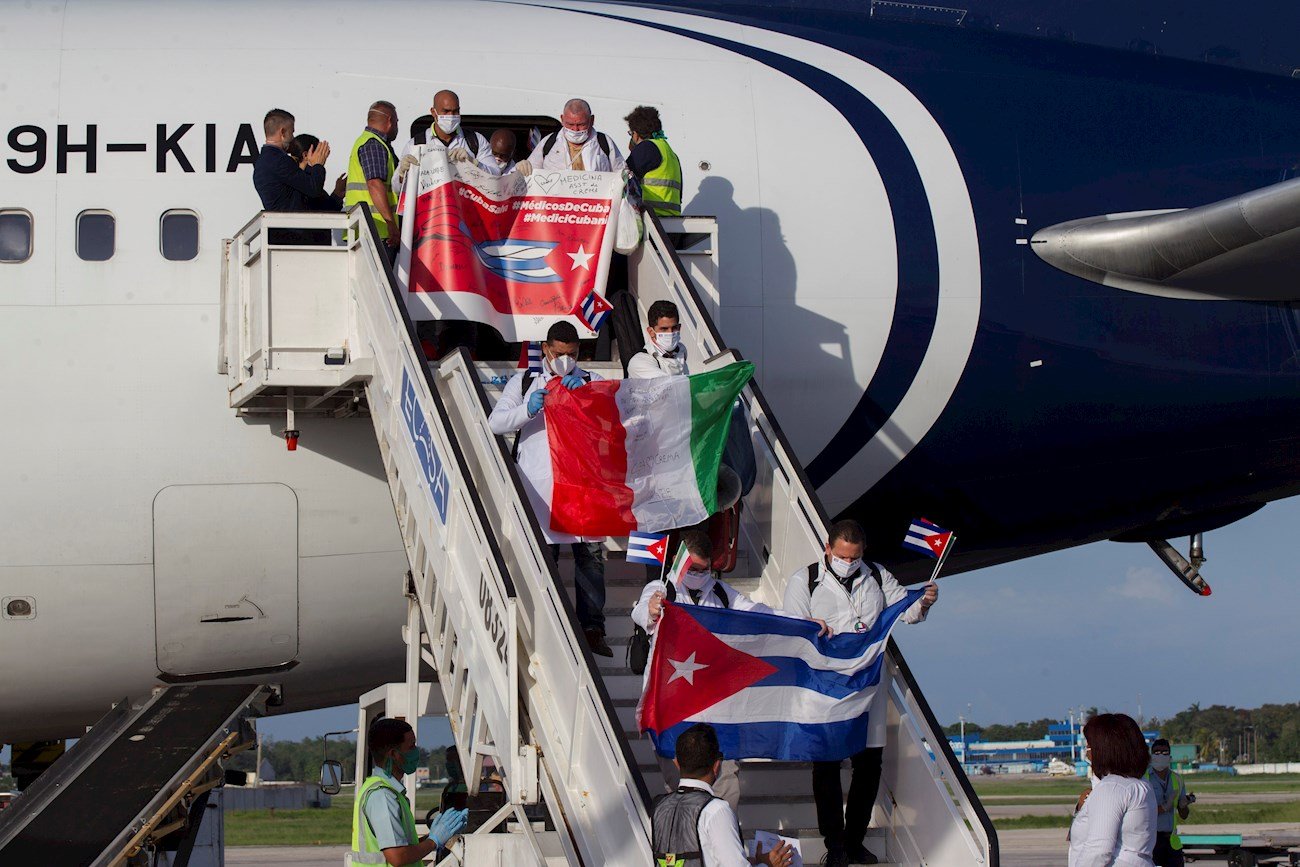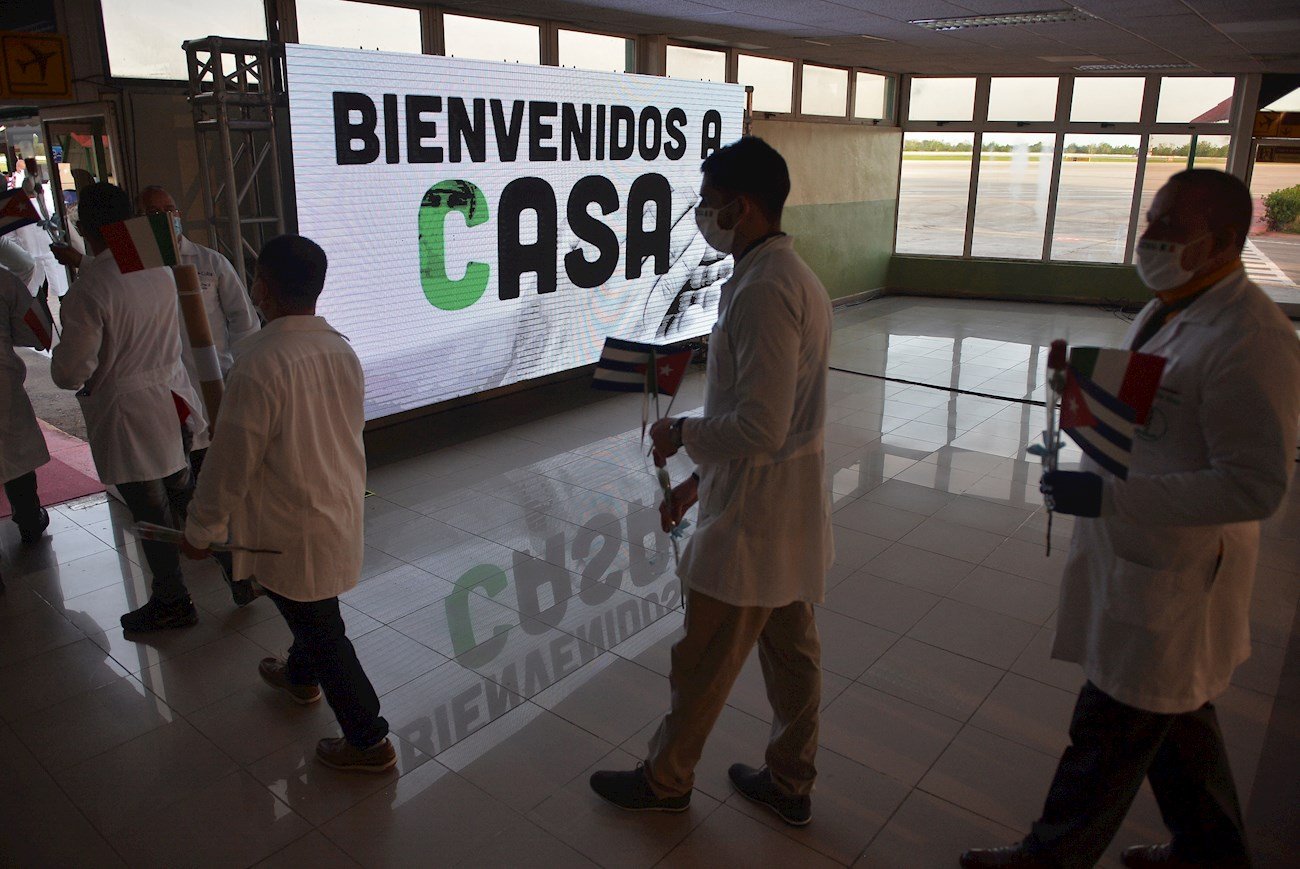Help us keep OnCuba alive here
A brigade of Cuban doctors who participated for more than two months in the fight against COVID-19 in Lombardy, the region of Italy most affected by the pandemic, returned Monday to Havana, where Cuban President Miguel Díaz-Canel welcomed them through a television broadcast they saw at the airport.
The 52-member health brigade which is part of the Henry Reeve internationalist contingent ―specialized in disasters and serious epidemics―was the first to leave Cuba to assist in controlling the pandemic at the request of the Italian authorities.
Con tremenda emoción y admiración dimos bienvenida a nuestros Valientes. Un abrazo desde el corazón y los sentimientos, desde la distancia física, pero cercanos por la gratitud ante el ejemplo. #CubaPorLaVida pic.twitter.com/x8cemkJfmY
— Miguel Díaz-Canel Bermúdez (@DiazCanelB) June 8, 2020
The reception of the brigade of 36 doctors, 15 nurses and a logistics specialist at José Martí airport in Havana had extensive media coverage in the Caribbean country, although it was marked by strict biosecurity measures according to established protocols.
The reception
President Miguel Díaz-Canel, accompanied by Prime Minister Manuel Marrero, Public Health Minister José Ángel Portal, and other high government representatives, participated through a video appearance in the official ceremony welcoming the medical brigade―broadcast live on state television.
In his message, the Cuban president highlighted the “example” and the “intense, risky and heroic” work carried out by the doctors, as well as the “deep rejoicing” for their “victorious” return with “the most humanitarian and noble of the missions accomplished: saving lives.”

He also praised the medical brigade’s “noble gesture” and willingness to “defy death” and stressed that “people from all parts of the world trust in the professional and human quality of health workers in Cuba.”
In his words of recognition, Díaz-Canel told the brigade members that “they have shown the world a truth that Cuba’s enemies have tried to silence or misrepresent: the strength of Cuban medicine.”
In this sense, the president reiterated his denunciations of a “huge, million dollars’ worth and mendacious campaign of discredit and infamous attacks” by “U.S. spokesmen” against the Cuban government.
Medical missions have become a battlefront between Cuba and the United States, which urges countries that request aid from Havana to examine agreements with its government, which they accuse of withholding most of the salary of health personnel while exposing them to “appalling working conditions.”
Cuba, for its part, calls these accusations “lies” and “immoral campaign” and has asked to put aside “pettiness and hostility” in the midst of the pandemic.
Díaz-Canel expressed his country’s “healthy pride” for the growing international movement to nominate the Henry Reeve contingent brigades for the Nobel Peace Prize.

This brigade that provided services in the red zone of the Italian city of Crema (Lombardy) was transferred this Monday to Las Praderas international health center where it will remain for two weeks under strict quarantine.
Cuba has sent 34 brigades―made up of 3,337 doctors and nurses―at the request of the authorities of 27 countries in Africa, America and Europe. So far they have treated more than 61,000 patients infected with SARS-CoV-2, according to data from the island’s Ministry of Public Health.
The Henry Reeve international medical contingent was created by the late former President Fidel Castro in 2005 to help the state of Louisiana (USA) after the devastating passage of Hurricane Katrina, but Washington rejected the aid.
About five years ago, members of the Henry Reeve contingent helped control the Ebola epidemic in Africa, and their work was recognized by the World Health Organization (WHO) with an award in 2017.










